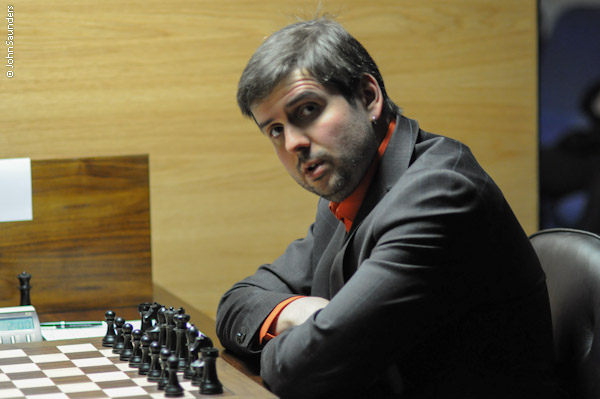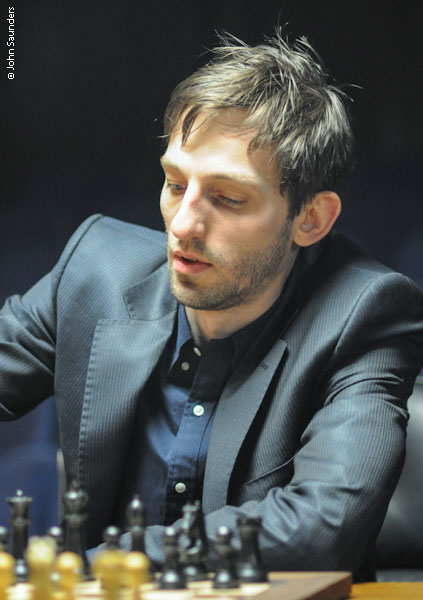London 2013 will go down in chess history. That much we know already. It has been the most astonishing tournament. OK, round one was a quiet start, but since then it has pulsated with action all the way.
Just one round to go now and the scores are
Carlsen, Kramnik 8½/13, Aronian, Svidler 7, Gelfand, Grischuk 6, Ivanchuk 5, Radjabov 4. Only the top two can now win the tournament, but in the event of a tie, we already know that Carlsen is better on tie-break and qualifies for a title match with Vishy Anand.
EVERYONE'S A WINNER
This has been the tournament which just goes on giving. It can only have only winner in terms of who goes through to the world championship final match - we won't know who that is until the end of the last round - but in truth it has produced a long list of winners...
WINNER NO.1 - classical chess - in the past and at the beginning of the tournament some gloom and doom merchants have been predicting the death of the longplay form of the game. Seems laughable now, doesn't it?
WINNER NO.2 - the format - Bobby Fischer didn't think much of an all-play-all format for the Candidates' competition, and there was a switch to match play for many decades, but the a.p.a. format worked a treat here. Maybe we could quibble about the merits of a play-off for first in the event of a tie (and Vlad Kramnik will count himself very unlucky if his world championship challenge founders on something trivial like number of wins), but that is the only drawback. And I think we should laugh off any daft ideas of collusion for or against any players. OK, Chucky plays like a genius one day and a buffoon the next, but he's not doing it on purpose to mess up any specific player's chances. His brain is too randomly wired for any Machiavellian mullarkey of that ilk.
WINNER NO.3 - the audience. I haven't come across any chess fan or journalist who hasn't been thrilled by this tournament.
WINNER NO.4 - the organisers and officials. There were murmurings at the start but everything seems to have come good.
WINNER NO.5 - good ol' London town. Tournament chess had its birth in the English capital and it is still an ideal venue for elite chess. Last year the 2012 Olympics were a triumph and this year, despite the absence of home players, this tournament has already gone down in history as one of the all-time greats. Something for the nation to be proud of, although most of them will be unaware of it, of course (their loss).
WINNER NO.6 - the players, collectively. Though some have scored more points than others, they've all contributed immensely to the success of the event with some fighting chess and entertaining comments at press conferences. You'd be hard put to find such a sporting, good-humoured, courteous field of sports people.
OK, that's effusion overdrive for now, but I felt the need to capture the elation of the moment. Everybody I've communicated with this evening at the venue has been knocked out by the excitement of yet another great round of chess. Round 12 was amazing, but Round 13 delivered some more amazing twists.
Below, photos of the two guys left standing in the race for the world title spot. At the beginning of the day, Vlad was the strong favourite according to most pundits, but by the end of a long, gruelling day's chess, he had been replaced as favourite (albeit not quite so strong) by Magnus.
 |
| After polishing his glasses (as always), Vladimir Kramnik sits calmly at the board at the beginning of his 13th round game with Gelfand. You can bet he is a bag of nerves inside, though. |
KRAMNIK - GELFAND
Kramnik was half a point clear of Carlsen at the start of the penultimate round, with the white pieces against Boris Gelfand. But the Israeli is not so easily beaten. Indeed, if Vlad fails to secure first, he may look back and compare his results against Boris (two draws) with those of Magnus (two wins) and see them as the difference between qualifying and being left out in the cold.
Vlad Kramnik came up with a novel, though slightly ungainly, innovation for this vital game, and it elicited smiles from the other players at the start. But Boris Gelfand was impressed and complimented the former world champion on having produced more new opening ideas than the rest of the players put together. (High praise indeed from someone so dedicated to opening preparation.)
Kramnik will probably look back at this as one that got away. No cast-iron wins were missed but he had several better continuations found by computers. Gelfand's defensive play was characteristically tough and resourceful. Though downed twice by Carlsen, he comes away from the tournament with his reputation intact and popularity undimmed. A great role model for aspirant chessplayers.
RADJABOV - CARLSEN
Sitting down to try and win games with Black could be seen as unrealistic at this level of play but there seems little doubt that this is what Carlsen does. He doesn't do it in any overtly aggressive way, of course, but tries to overcome the opposition by stealth. No description of this game can get to heart of the 'long-drawn-outness' of its seven-hour length.
One of the best ways to enjoy a Carlsen game is to imagine you are his opponent. Then it becomes like a sort of delicious, creeping horror, like an Edgar Allan Poe story. For hours you think you have all the doors and windows closed, and struggle to see by what route the 'red death' will enter the city - and then suddenly it is all around you. I think it was around six hours in when the press room's collective opinion switched from 'even Magnus can't win this' to 'Radjabov is a dead man walking'.
All in all there seven hours of attritional chess, followed by a 15-second standing ovation from a deeply-impressed audience. To give you an idea (if you were unfortunate enough not to have followed it in real time), Kramnik and Gelfand also fought a long and arduous game but the decisive phase of Radjabov-Carlsen had barely started when the Kramnik-Gelfand post-game press conference finished. Kramnik pooped back into the room, scanned the game quickly and went off, probably in the perfectly reasonable hope that Carlsen would achieve no more than a draw and thus still be trailing him in round 14.
It's time everybody stopped being surprised by Carlsen's relentless, never-say-draw
modus operandi since he pulls off these miracles time and time again. Of course, he needs help from his opponent but even the hardiest super-GM can't seem to shake off the sense of creeping death which comes over the game from about the fifth hour onwards.
 |
| Magnus Carlsen opts for his favourite sulky teenager look at the start of his game with Radjabov. |
At the end of the game Carlsen's arrival in the press room was a huge contrast to that of Good Friday when Ivanchuk crucified him. He entered the room, rushed up to his manager Espen Agdestein and high-fived him in elation. Cool and calm is the mask he likes to show us most of the time but Carlsen is clearly passionate in his quest for the world title (though he has many times feigned otherwise). Truly, we have seen the resurrection. But Easter Monday is yet to come, of course.
 |
He may be in last place but nobody can beat Teimour Radjabov for the neatness of his pieces on their squares. Teimour fought a long battle with Magnus Carlsen and seemed to be within reach of a draw for much of its course.
|
GRISCHUK - ARONIAN
After his tragic loss to Kramnik in round 12, Levon Aronian's interest in the tournament was resided more in the value of third prize rather than any forlorn hope of a melt-down by the top two. He had a closely-fought game with Grischuk, where the Russian stood better for some time, but it ended naturally in a draw.
 |
Levon Aronian had to hope that the two players ahead of him both had a major melt-down. It didn't happen so he must slug it out with Peter Svidler for third prize.
|
 |
Alexander Grischuk looks relaxed (but then he always does). He and Levon Aronian drew.
|
SVIDLER - IVANCHUK
Nothing much was riding on this game but it was hard fought and entertained the crowd. Once again, much interest centred on which Chucky turned up. Would it be Chucky The Carlsen Killer? No, it wouldn't... it turned out to be Chucky The Unready (to make all his moves within the allotted time). Peter Svidler, on his own at the press conference, commented on Ivanchuk's eccentric behaviour in turning away from the board when he was already in desperate time shortage and then spending precious seconds figuring out and recording the move Peter had played during his day dream.
Five losses, all on time, but credit to Svidler, he gave him a very hard time and it was the logical result of a well-played game. There was
 |
| Peter Svidler and Vassily Ivanchuk have both done Vlad Kramnik a big favour (by beating Levon Aronian and Magnus Carlsen respectively). They faced each other. in round 13 and Chucky had another off-day, losing his fifth(!) game on time. |


































